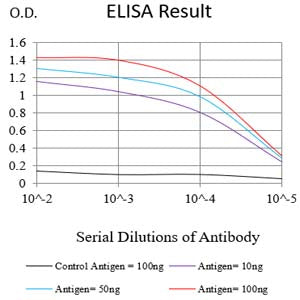
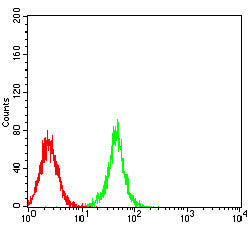
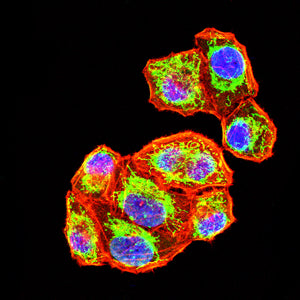
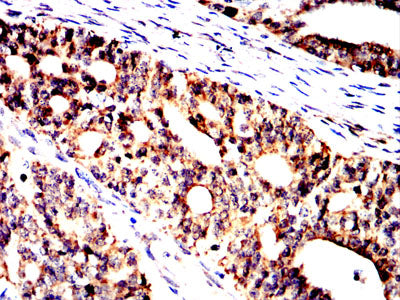
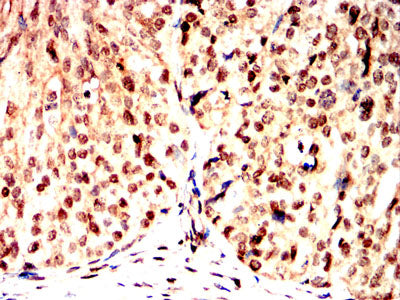
| WB | 咨询技术 | Human,Mouse,Rat |
| IF | 咨询技术 | Human,Mouse,Rat |
| IHC | 1/200 - 1/1000 | Human,Mouse,Rat |
| ICC | 1/200 - 1/1000 | Human,Mouse,Rat |
| FCM | 1/200 - 1/400 | Human,Mouse,Rat |
| Elisa | 1/10000 | Human,Mouse,Rat |
| Aliases | Gem; MGORS6 |
| Entrez GeneID | 51053 |
| clone | 1H11G5 |
| WB Predicted band size | 23.6KDa |
| Host/Isotype | Mouse IgG1 |
| Antibody Type | Primary antibody |
| Storage | Store at 4°C short term. Aliquot and store at -20°C long term. Avoid freeze/thaw cycles. |
| Species Reactivity | Human |
| Immunogen | Purified recombinant fragment of human GMNN (AA: FULL 1-209) expressed in E. Coli. |
| Formulation | Purified antibody in PBS with 0.05% sodium azide |
+ +
以下是关于GMNN抗体的3篇参考文献及其摘要概括:
---
1. **"Germinin prevents re-replication by targeting the Cdt1 protein for ubiquitin-dependent proteolysis"**
*作者:McGarry, T.J., & Kirschner, M.W. (1998)*
**摘要**:该研究首次报道了GMNN(Germinin)通过与Cdt1结合并抑制其功能,阻止DNA复制的再起始。文中使用GMNN抗体进行免疫共沉淀实验,验证了GMNN与Cdt1的相互作用机制,揭示了其在细胞周期调控中的关键作用。
---
2. **"Regulation of DNA replication by the germinin-Cdt1 axis"**
*作者:Tachibana, K., et al. (2005)*
**摘要**:文章系统分析了GMNN与Cdt1在脊椎动物细胞中的调控关系,利用GMNN抗体通过Western blot和免疫荧光技术,证明GMNN在S/G2期通过结合并抑制Cdt1.确保DNA复制仅发生一次,维持基因组稳定性。
---
3. **"Germinin as a prognostic marker in colorectal cancer"**
*作者:Juríková, M., et al. (2016)*
**摘要**:该临床研究探讨GMNN作为肿瘤增殖标志物的潜力。通过GMNN抗体对结直肠癌组织进行免疫组化分析,发现GMNN高表达与患者不良预后显著相关,提示其可作为癌症诊断和治疗的潜在靶点。
---
以上文献均涉及GMNN抗体的实验应用,涵盖基础机制研究(如蛋白互作、细胞周期调控)及临床转化方向(如癌症预后标记)。如需具体DOI或期刊信息,可进一步补充检索。
GMNN (Geminin) is a cell cycle regulatory protein that plays a critical role in controlling DNA replication and cell division. It acts as an inhibitor of DNA re-replication by binding to and neutralizing Cdt1. a licensing factor required for the assembly of the pre-replication complex (pre-RC) during the G1 phase. By preventing the reloading of replication origins during the S and G2 phases, GMNN ensures that each cell cycle proceeds with a single round of DNA replication, maintaining genomic stability. Structurally, GMNN contains a coiled-coil domain essential for its dimerization and interaction with Cdt1. and its expression is tightly regulated, peaking during the S/G2 phases and degrading via the anaphase-promoting complex/cyclosome (APC/C) during mitosis.
GMNN antibodies are widely used in research to study cell cycle dynamics, stem cell differentiation, and cancer biology. Dysregulation of GMNN has been linked to tumorigenesis, as its overexpression can disrupt replication control, leading to genomic instability and oncogenesis. Additionally, GMNN is implicated in developmental processes, including neural differentiation and organogenesis. Researchers employ GMNN-specific antibodies in techniques such as Western blotting, immunofluorescence, and flow cytometry to assess protein expression, localization, and cell cycle progression in various models. These tools are vital for elucidating GMNN's role in health and disease, offering potential insights into therapeutic strategies targeting cell cycle abnormalities.
×